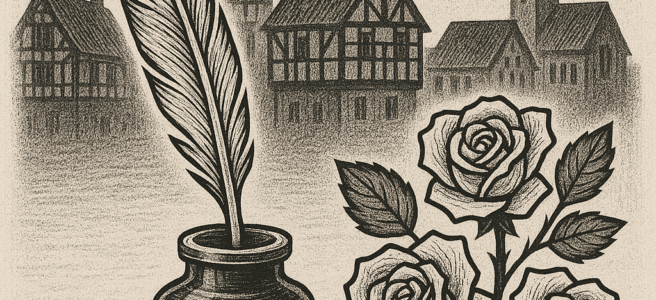The following is an experiment in fiction. I’m having a conversation with one of the AIs, and it’s writing the story. What I find fascinating is that it’s arguing with me, and seems to know a lot about the proper historical context. I wanted to write something of a prequel to Shakespeare’s career. I wanted to explore the space where Marlowe and Shakespeare lived concurrently. All I’m doing is asking questions and hinting at how I’d like the story to be structured.
Let me know what you think in the comments. Worth continuing?
-SG
Easter Week, 1592
The Thames stank of spring mud, fish heads, and the slow thaw of winter sins. Southwark’s alleys streamed with apprentices jingling their last pennies, orange-girls lifting skirts to wade through puddles, and two velvet-clad gallants betting how many groundlings would faint before the trumpet sounded.
William Shakespeare arrived unnoticed. His boots leaked, his cloak was mostly holes, but ambition beat in his chest like a second heart. Three days earlier, the Lord Strange’s Men had accepted his new chronicle—tentatively titled Harry the Sixth—for a single performance. One afternoon to turn a scribbled name into London’s next cry of wonder.
He paid his penny, surrendered his dagger at the door, and slipped into the yard. The Rose’s galleries arched like the ribs of a wrecked ship, timbers still weeping sap. Somewhere inside, the company rehearsed the pre-show jig. Will closed his eyes, tasting the future: creak of rope, flare of oil lamps, hush before a thousand strangers drew one breath.
A shoulder rammed his ribs. “Christ’s nails, stand aside!” A tire-man staggered past with spears of pasteboard. Will stepped back, slipped in the mud, and collided with something softer than a post—and infinitely more dangerous.
“Steady, countryman,” a voice murmured, amused. “The groundlings will trample anything that smells of Stratford.”
Will steadied himself, looking down into eyes the colour of gun-smoke shot with violet. The stranger was slight, twenty-six at most, in black velvet cut fashionably short. A silver earring—a single hoop no larger than a farthing—glinted against the pale lobe. To Will, fresh from Warwickshire where only sailors and gypsies wore such ornaments, it looked scandalously elegant: a tiny moon daring every word from that mouth to cut as cleanly as any blade.
“Christopher Marlowe,” the stranger said, extending a gloved hand. “The company calls me Kit.”
William Shakespeare—still unknown, still hungry—felt the name strike him behind the knees. Kit Marlowe: the Cambridge wit whose Tamburlaine had thundered the Rose into legend only last winter. He had pictured a bearded giant; instead he held the hand of a sleek, bright-eyed leopard.
Their conversation—equal parts duel and duet—spun from accents to metaphors, from debts to dreams. Kit recited Will’s own line about “the gaudy, blabbing, and remorseful day” with a grin sharp enough to shave with. “You owe me a cup of Canary for teaching you how to wring a metaphor’s neck,” he teased.
Will flushed. “I’ll stand you the wine the moment receipts are counted.”
“Receipts!” Kit laughed. “You’ll wait longer than Lazarus if you trust Henslowe’s purse. Come, Will-of-Stratford—let’s find somewhere the floorboards don’t slap like wet linen.”
Together they climbed to the lords’ room—close enough to smell pomander and lamp-oil, far enough from the mob to speak truths. A half-circle of gentlemen nodded to Kit; one hawk-nosed man with jewelled fingers shifted aside, eyeing Will’s country garb. Kit produced a flask of Rhenish and two fresh cups.
Below, the Prologue stepped onto the boards:
“Hung be the heavens with black, yield day to night…”
Will’s own lines—trimmed, tailored, terrifying—were coming to life in the mouth of London’s greatest actor. Kit watched, not the stage but Will: the flare of nostril, the parted lips, the moment the Stratford man forgot to breathe.
During the brief hush before Act Two, Kit tipped the last of the wine between them. “Tell me,” he said, voice softer now, “what do you miss most when London shuts its gates on you?”
Will traced a knot in the rail with his thumb. “The quiet. Not silence—Stratford’s never silent—but the sort that lets a man hear his own thoughts without a dozen pamphleteers shouting them down.” He glanced sideways. “I have a daughter sharp enough to bargain with peddlers. Susanna’s seven. She asked why all the women in my plays die; I had no answer fit for seven.”
Kit tilted the pewter cup until the torch-flame caught the silver hoop; for a heartbeat he studied its warped twin grinning back at him, then looked to Will.. “I keep no letters from home. My father still hopes I’ll take the living at St George’s. He thinks ink is a phase, like the pox.” He lifted his cup. “To promises we don’t know how to keep.”
Will touched pewter to pewter. “And to the fields and bells we left behind.”
The trumpet blared for Act Two. Kit brushed Will’s sleeve—an ember of contact, quick as a heartbeat—then turned back to the lights, the thunder, the future neither could yet name.
London, for one bright afternoon, held its breath.
What do you think so far? Should we continue? Did it get anything wrong, that I’m missing? Let me know in the comments!


I love this! Keep it up.
Thanks! Chapter 2 is up now!